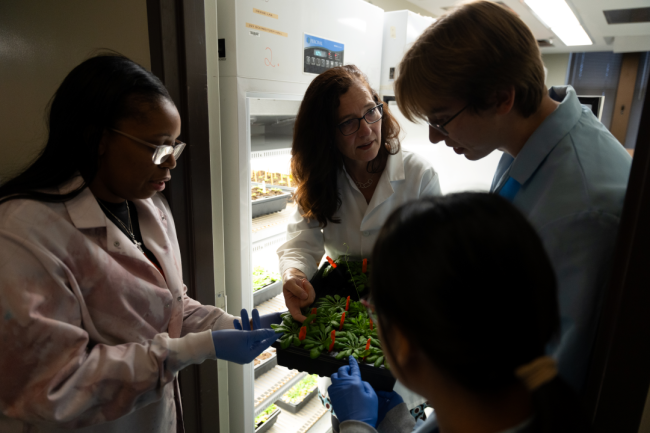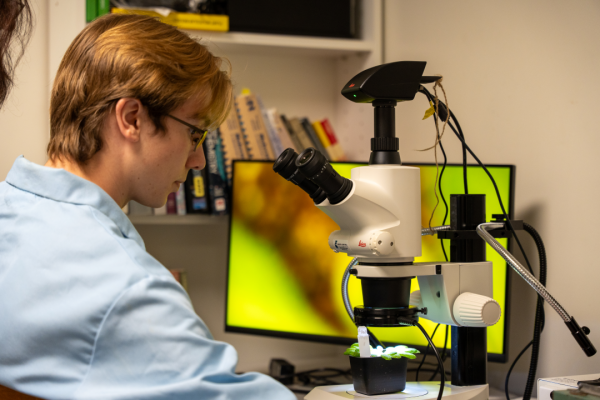You have /5 articles left.
Sign up for a free account or log in.

First-year students have the unique privilege to participate in faculty-led research projects at the University of Missouri through the Freshman Research in Plants program.
University of Missouri
The University of Missouri at Columbia is known for its Interdisciplinary Plant Group, housed in the College of Agriculture, Food and Natural Resources, which hosts research scholars who are exploring innovations in plant biology. One program at Mizzou allows first-year students to participate in plant research as soon as they start on campus, opening early doors into experiential learning and academic research.
The FRIPS program, short for Freshmen Research in Plants, is a 14-year-old initiative that has grown over the years, with more than 45 faculty members serving as mentors to researchers. The program accelerates students with an interest in plant biology, providing hands-on opportunities to learn in a community of undergraduate, graduate, postdoctoral and faculty researchers.
Fertile soil: Within IPG, seven different departments across colleges work with plants for various projects, from chemistry and agriculture to computer science, explains Linda Blockus, director of undergraduate research at Mizzou.
In 2010, Mizzou staff started talking with faculty members about how they could fulfill National Science Foundation grant funding requirements, which include discussion on the broader impacts of funding, or how the money will create tangible benefits to society beyond intellectual merit. Blockus recognized an opportunity to create a new program that would address both student interest and grant requirements.
“We have a gap here: we have really awesome research and really awesome faculty mentors … and then I’ve got all these kids coming in, undergraduate students, that want to do research, interested in genetics, but have no clue how awesome the plant genetics group is here,” Blockus says. “So let’s put these together and provide an early opportunity for freshmen who already know in some way they’re interested in research.”
Mizzou has other programs that are geared toward access and inclusion, but FRIPS is for accelerating students who want to jump in as soon as possible.

Many students who participate in FRIPS continue in plant research throughout their careers at Mizzou.
The University of Missouri
Planting seeds: Recruitment for FRIPS begins in summer orientation for admitted first-year students, and applications open prior to the start of the academic year and are available through the first few weeks of the semester.
Around 10 to 15 positions are open for a given academic year. As part of the application, students complete an interview with Sarah Humfeld, assistant director of undergraduate research, who manages the FRIPS scholars. Prior experience isn’t required, just a genuine interest in plant science.
“It’s intended to be a holistic experience,” Humfeld says. “I have stopped looking at high school GPA, high school graduation placement … I really want to look at those answers they give me about why I want to do it, why I want to do it now and why do I want to do it with plants?”
Humfeld pairs students with a faculty mentor based on interests and placement opportunities for that given year. Over the years, 45 faculty members have hosted FRIPS students.
Once selected, students work in a research lab for around eight to 10 hours per week, accommodating their class schedules, and they engage in a weekly meeting with the FRIPS cohort and a weekly meeting with their lab group. Humfeld hosts the weekly meetings, which include professional development education.
Mentorship is embedded throughout the experience, as well.
“Some of our mentors will do direct mentoring with the students, but a lot of times, as is common with science labs, they’re working more directly day to day with a graduate student or postdoctoral fellow,” Humfeld says. “Some of them are working more directly and being mentored by older FRIPS alumni.”
Fertilizer for growth: The program’s success is in part due to the faculty, which invests in students as mentors, and also because of the collaboration across the IPG, Blockus says.
For each year a faculty member renews their research grant, they’ll include funding for one to four students. So, if a faculty member is between grants, someone else in the IPG group will “host” a student, providing the grant funding required to keep a first-year student involved in a lab group.
“Because there’s a lot of collaboration on the research already, faculty are super happy to help, and, in some cases, some students will start in one lab and then migrate to another,” Blockus explains.
Faculty members have bought in to the idea and shared it widely. “I’ll get emails from brand-new faculty; they’ve been on campus for two weeks and … [say], ‘I want to know more,’” Humfeld says.
Blooming and harvesting: The first FRIPS cohort in 2010 hosted four students. In 2022–23, the program hosted 18 learners, thanks to additional faculty members showing an interest in the work.
Graduates of FRIPS often continue in the IPG lab space, and after graduating from Mizzou, some have become Goldwater Scholars and NSF graduate research fellowship recipients themselves. One-third of Mizzou’s Goldwater applicants this year are FRIPS alumni, as well.
The program also provides a place of community and belonging for new students, which became most clear to staff during the COVID-19 pandemic. One student told Humfeld that FRIPS was the reason he stayed enrolled during remote instruction because the program’s meetings were one thing he looked forward to during the week.
Blockus says, “Having those weekly meetings that build community just gives the student an anchor on campus.”
If your student success program has a unique feature or twist, we’d like to know about it. Click here to submit.




